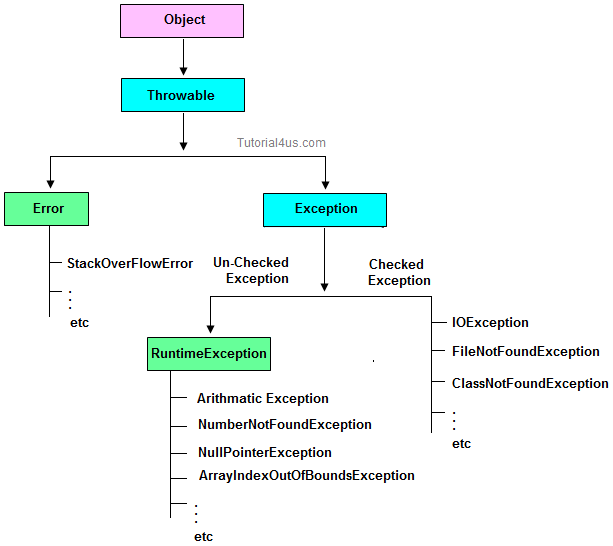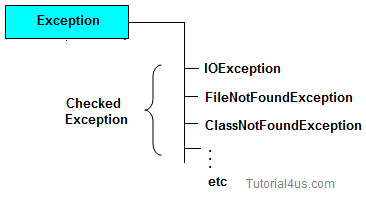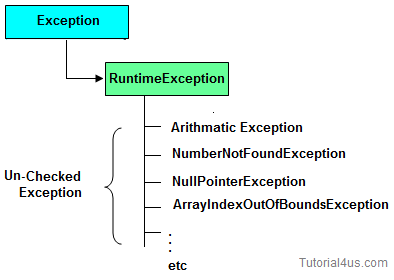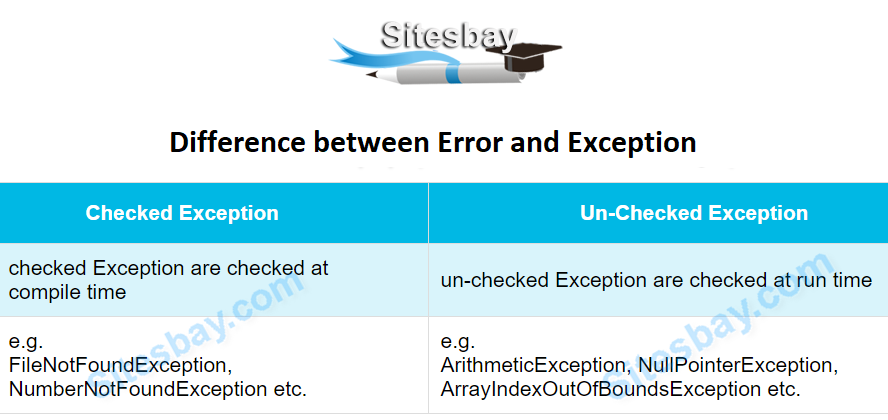Exception Handling in Java
Exception Handling in Java
The process of converting system error messages into user friendly error message is known as Exception handling. This is one of the powerful feature of Java to handle run time error and maintain normal flow of java application.
Exception
It is an event, which occurs during the execution of a program, that disrupts the normal flow of the program's Instructions.
Why use Exception Handling
Handling the exception is nothing but converting system error generated message into user friendly error message. Whenever an exception occurs in the java application, JVM will create an object of appropriate exception of sub class and generates system error message, these system generated messages are not understandable by user so need to convert it into user friendly error message. You can convert system error message into user friendly error message by using exception handling feature of java.For Example: when you divide any number by zero then system generate / by zero so this is not understandable by user so you can convert this message into user friendly error message like Don't enter zero for denominator.
Hierarchy of Exception classes

Type of Exception
- Checked Exception
- Un-Checked Exception
Checked Exception
Checked Exception are the exception which checked at compile-time. These exception are directly sub-class of java.lang.Exception class.
Only for remember: Checked means checked by compiler so checked exception are checked at compile-time.

Un-Checked Exception
Un-Checked Exception are the exception both identifies or raised at run time. These exception are directly sub-class of java.lang.RuntimeException class.
Note: In real time application mostly we can handle un-checked exception.
Only for remember: Un-checked means not checked by compiler so un-checked exception are checked at run-time not compile time.

Difference between checked Exception and un-checked Exception
| Checked Exception | Un-Checked Exception | |
|---|---|---|
| 1 | checked Exception are checked at compile time | un-checked Exception are checked at run time |
| 3 | e.g. FileNotFoundException, NumberNotFoundException etc. | e.g. ArithmeticException, NullPointerException, ArrayIndexOutOfBoundsException etc. |
Difference between Error and Exception
| Error | Exception | |
|---|---|---|
| 1 | Can't be handle. | Can be handle. |
| 2 | Example: NoSuchMethodError OutOfMemoryError | Example: ClassNotFoundException NumberFormateException |
Handling the Exception
Handling the exception is nothing but converting system error generated message into user friendly error message in others word whenever an exception occurs in the java application, JVM will create an object of appropriate exception of sub class and generates system error message, these system generated messages are not understandable by user so need to convert it into user-friendly error message. You can convert system error message into user-friendly error message by using exception handling feature of java.
Use Five keywords for Handling the Exception
- try
- catch
- finally
- throws
- throw
Syntax for handling the exception
Syntax
try
{
// statements causes problem at run time
}
catch(type of exception-1 object-1)
{
// statements provides user friendly error message
}
catch(type of exception-2 object-2)
{
// statements provides user friendly error message
}
finally
{
// statements which will execute compulsory
}
Example without Exception Handling
Syntax
class ExceptionDemo
{
public static void main(String[] args)
{
int a=10, ans=0;
ans=a/0;
System.out.println("Denominator not be zero");
}
}
Abnormally terminate program and give a message like below, this error message is not understandable by user so we convert this error message into user friendly error message, like "denominator not be zero".

Example of Exception Handling
Example
class ExceptionDemo
{
public static void main(String[] args)
{
int a=10, ans=0;
try
{
ans=a/0;
}
catch (Exception e)
{
System.out.println("Denominator not be zero");
}
}
}
Output
Denominator not be zero
Next -- try and catch block



